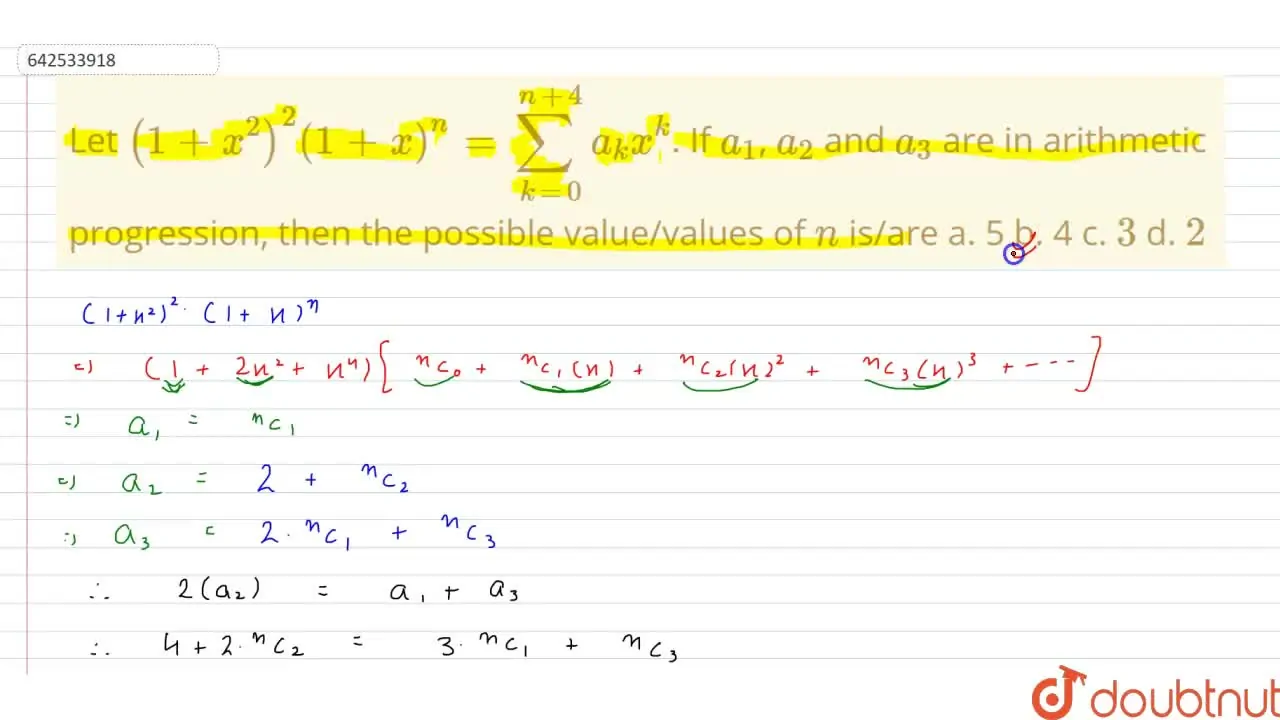Let (1+x2)2(1+x)n=n+4∑k=0akxk. If a1, a2 and a3 are in arithmetic progression, then the possible value/values of n is/are a. 5 b. 4 c. 3 d. 2
We have,
(1+x2)2(1+x)n=(1+2x2+x4)
×(nC0+nC1x+nC2x2+nC3x3+…)
=a0+a1x+a2x2+a3x3+… [say]
Now , comparing the coefficients of x,x2and x3 , we get
a1=nC1,A2=2⋅nC0+nC2,A3=2⋅nC1+nC3 ....(i)
In a1n≥,ina2,n≥2 and in a3,n≥3
∴n≥3 ...(ii)
From Eq.(i) ,
a1=n,a2=2+n(n−1)1⋅2=n2−n+42
and a3=2n+n(n−1)(n−2)1⋅2⋅3=n3−3n2+14n6
Since , a1,a2,a3 are in AP .ltbr> Therefore , 2a2=a1+a3
⇒n2−n+4=n+n3−3n2+14n6
⇒n3−9n2+26n−24=0
or (n−2)(n−3)(n−4)=0
∴n=2,3,4
Hence , n = 3,4 [from Eq.(ii)]
Related Playlists
Similar Questions
Let (1+x2)2.(1+x)n=Σn+4k=0(ak).xkifa1,a2&a3 are in AP find n
View SolutionLet (1+x2)2(1+x)n=A0+A1x+A2x2+...... If A0,A1,A2, are in A.P. then the value of n is
View SolutionLet A1,A2…..,A3 be n arithmetic means between a and b. Then the common difference of the AP is
View SolutionIf for n∈I,n>10;1+(1+x)+(1+x)2++(1+x)n=n∑k=0ak⋅xk,x≠0 then
View SolutionLet a1,a2,a3,... be in harmonic progression with a1=5anda20=25. The least positive integer n for which an<0 a.22 b. 23 c. 24 d. 25
View SolutionIf xn−1 is divisible by x−k then the least positive integral value of k is(a) 1 (b) 2 (c) 3 (d) 4
View SolutionIf a1,a2,a3,....an are positive real numbers whose product is a fixed number c, then the minimum value of a1+a2+....+an−1+3an is
View SolutionIf a1+a2+a3+......+an=1∀ai>0,i=1,2,3,......,n, then find the maximum value of a1a2a3a4a5......an.
View SolutionIf a1,a2,a3,....an are positive real numbers whose product is a fixed number c, then the minimum value of a1+a2+.......an−1+2an is
View SolutionLet f(n)=n∑k=1k2^(n)Ck)2 then the value of f(5) equals
View Solution


